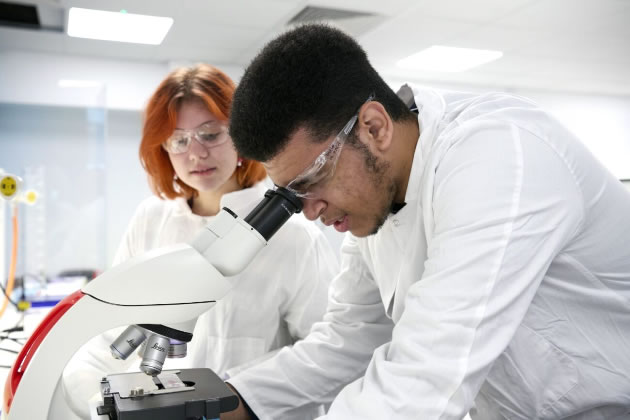New School of Medicine and Biosciences Launches in Ealing
University of West London hopes it will improve health of local communities

School aims reduce inequalities by developing hyperlocal health and social care initiatives
April 17, 2024
The School of Medicine and Biosciences (SMB), a new interdisciplinary research-driven school at the University of West London (UWL), is opening its doors in Ealing this Wednesday (17 April).
The aim of the school is to improve the health of local communities and reduce inequalities by developing and delivering hyperlocal health and social care initiatives. These could have the potential to scale up nationally, working in partnership with policymakers and front-line practitioners, including the Chelsea & Westminster Hospital NHS Foundation Trust and the London Ambulance Service NHS Trust.
Professor Anthony Woodman, Provost and Senior Deputy Vice-Chancellor, will head the new interdisciplinary school, “Our vision for The School of Medicine and Biosciences is to deliver more research-led undergraduate and postgraduate courses, building on UWL’s track record of translating rigorous research into practice and policy, developing the next generation of scientists from undergraduates through to world-leading researchers. The research will focus on ageing and dementia, healthcare inequalities and enabling healthcare and apply its expertise in a number of areas, from malnutrition treatment and infection control to VR-assisted medical training, Artificial Intelligence (AI) scan processing and gene-targeted cancer therapy.”
The Geller Institute of Ageing and Memory (GIAM), a pioneering research institute headed by Professor Katie Featherstone, will be at the heart of The School of Medicine and Biosciences. In 2022, GIAM published a groundbreaking report on the culture of continence care for older people following acute hospital admissions. This was cited as one of the top eight NIHR research projects of the year. In 2023, GIAM launched a blueprint for a dementia-friendly opera, which received widespread attention nationally. Dr Featherstone will give an inaugural professorial lecture to mark the launch of the School on 17 April: Wandering the Wards: understanding and transforming institutional cultures of care for people living with dementia.
World-leading gastroenterologist Professor Raymond Playford, who is Professor of Molecular Medicine at UWL, recently contributed to an international study involving centres in the UK (Queen Mary University), Zambia and Zimbabwe entitled Malnutrition enteropathy in Zambian and Zimbabwean children with severe acute malnutrition. Malnutrition underlies almost half of child deaths globally. Playford’s research shows the potential for a cheap, safe and non-invasive treatment of malnutrition using bovine colostrum, a milk-like substance produced in the first few days of calving. The paper is due to be published in the prestigious journal Nature Communications.
Other research taking place in the School includes ground-breaking cancer research to develop drugs that block the genes responsible for tumour growth (Professor Richard Morgan, Dean of Biomedical Sciences at the School), the use of Artificial Intelligence (AI) scan processing to improve medical diagnostics and treatments (Professor Konstantin Nikolic), and research that could revolutionise echocardiography to make clinical decision-making and the diagnoses and treatment of heart conditions more reliable (Professor Massoud Zolgharn).
Professor Peter John CBE, Vice-Chancellor of UWL, said, “The opening of the School of Medicine and Biosciences today is a very proud moment for the University of West London as it marks the achievement of a major strategic goal. With the School’s mission to improve the health of local communities and reduce inequalities by developing and delivering hyperlocal health and social care initiatives, it espouses what we do best at UWL – bringing meaningful, transformational change to people’s lives.”
Like Reading Articles Like This? Help Us Produce More This site remains committed to providing local community news and public interest journalism. Articles such as the one above are integral to what we do. We aim to feature as much as possible on local societies, charities based in the area, fundraising efforts by residents, community-based initiatives and even helping people find missing pets. We’ve always done that and won’t be changing, in fact we’d like to do more. However, the readership that these stories generates is often below that needed to cover the cost of producing them. Our financial resources are limited and the local media environment is intensely competitive so there is a constraint on what we can do. We are therefore asking our readers to consider offering financial support to these efforts. Any money given will help support community and public interest news and the expansion of our coverage in this area. A suggested monthly payment is £8 but we would be grateful for any amount for instance if you think this site offers the equivalent value of a subscription to a daily printed newspaper you may wish to consider £20 per month. If neither of these amounts is suitable for you then contact info@neighbournet.com and we can set up an alternative. All payments are made through a secure web site. One-off donations are also appreciated. Choose The Amount You Wish To Contribute. If you do support us in this way we’d be interested to hear what kind of articles you would like to see more of on the site – send your suggestions to the editor. For businesses we offer the chance to be a corporate sponsor of community content on the site. For £30 plus VAT per month you will be the designated sponsor of at least one article a month with your logo appearing if supplied. If there is a specific community group or initiative you’d like to support we can make sure your sponsorship is featured on related content for a one off payment of £50 plus VAT. All payments are made through a secure web site. |